You’d be forgiven for looking at the stats of the mid-1960s designed NSU Ro80 and thinking it was a much newer car. At the very least, it seemed quite futuristic compared to what was coming not only out of Detroit, but out of the rest of the world at the time. Aerodynamics were key to its slippery shape, unlike the rest of the world that relied on “jet†styling accents and fins to look fast. A tall, airy greenhouse provided excellent visibility for its passengers and driver. Underneath, power steering, 4-wheel independent suspension, 4-wheel disc inboard brakes and a semi-automatic gearbox with vacuum assisted clutch were the highlights – items that in some cases wouldn’t be found on mainstream cars until very recently. Then there was the engine; at only 1 liter, it didn’t sound like much to write about – but it was a twin-rotor Wankel engine with over 100 horsepower. Indeed, the power output wasn’t much less than most inline-6s of the day with 2 1/2 times the displacement. Couple that into a reasonably lightweight sedan and the performance of the NSU was certainly above average.
Looking at the NSU today, it’s easy to see design elements that were incorporated into later designs, mostly from the 1970s and 1980s. NSU’s parent Audi developed the exterior design elements further a decade and a half later into the Audi 100, most notably. Squint, and you can see it. But when I look, I also see elements from BMWs, Mercedes-Benz, Alfa Romeo, Citroen, Lancia, Fiat, and even Toyota, Mazda and Nissan – this was truly an influential design. For the most part, it was also a fringe automobile though, so not many people knew them or about the advanced platform that had been developed. They were also a bit too far ahead of the curve, suffering rotor-tip seal problems that wouldn’t really be solved for another decade by Mazda. On top of that, they were quite expensive at the time – meaning that for well-heeled buyers, the unreliability was even more unacceptable than normal. More recently in the past decade, the avant-garde Ro80 has finally been recognized by the world as a truly special page in history and a turning point in automotive design. That’s why it’s so special to see them pop up for sale, especially in America where they’ve always been rare:



